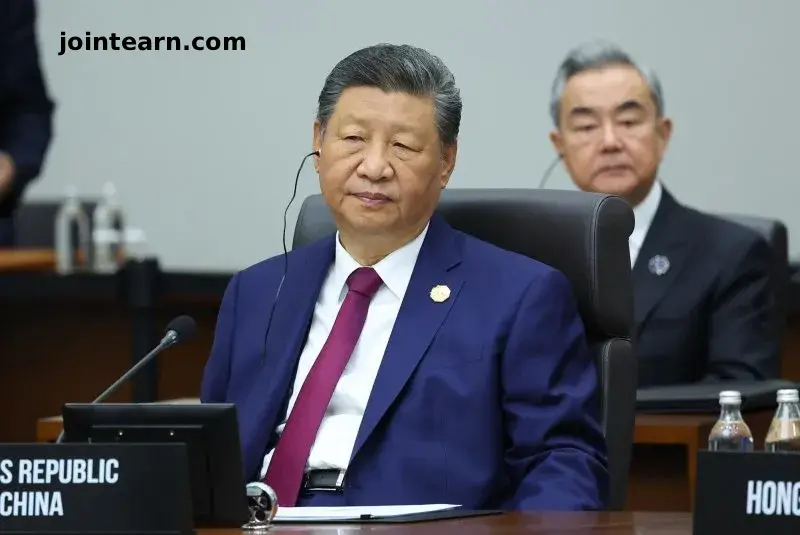
GYEONGJU, South Korea — October 31, 2025 — Chinese President Xi Jinping took center stage on the opening day of the Asia-Pacific Economic Cooperation (APEC) Summit on Friday, positioning China as a champion of free trade, open markets, and multilateralism amid rising global uncertainty and shifting power dynamics.
Just one day after his highly publicized meeting with U.S. President Donald Trump in Busan, Xi delivered a keynote address that emphasized global cooperation and the need to strengthen the World Trade Organization (WTO) framework. His remarks came as 21 APEC member economies gathered in the historic city of Gyeongju, South Korea, for two days of discussions on trade, sustainable development, and regional integration.
Xi Jinping’s Call for Unity and Economic Openness
Speaking to world leaders, Xi stressed that the Asia-Pacific region must remain united in the face of rising protectionism and economic fragmentation.
“We should work together to safeguard the multilateral trading system,” Xi said. “The international situation is fluid and turbulent. The rougher the seas, the more we must pull together.”
The Chinese leader highlighted that China’s commitment to economic openness remains firm, declaring, “China’s door to the world will not close — it will only open wider and wider.”
His remarks resonated with APEC’s founding principles of free trade and economic cooperation, themes that have defined the forum since its establishment in 1989.
Trump–Xi Meeting Sets the Stage
The summit followed a closely watched bilateral meeting between President Trump and Xi in Busan on Thursday, which helped ease tensions from their long-running trade dispute.
During the talks, Trump agreed to reduce tariffs on Chinese goods by 10%, while China pledged to pause export restrictions on rare earth minerals and resume soybean imports from the United States. Beijing also promised to tighten regulations on precursor chemicals used in fentanyl production, addressing one of Washington’s major security concerns.
Trump hailed the meeting as a “great success,” rating it “a 12 out of 10” in terms of outcomes. However, critics argued that the deal only partially rolled back the damage caused by years of tariff wars.
Senate Minority Leader Chuck Schumer criticized Trump on X (formerly Twitter), writing, “He started a trade war, created a giant mess for American businesses, consumers, and farmers, and now he’s trying to celebrate cleaning it up — without fixing the underlying issues.”
Despite the limited breakthrough, the meeting set a conciliatory tone for the APEC summit, allowing Xi to emerge as a leading voice for global economic stability and collaboration.
South Korea’s Role and the Push for the ‘Gyeongju Declaration’
Host nation South Korea, under President Lee Jae Myung, emphasized the urgency of cooperation amid growing geopolitical and economic volatility.
“We are at a critical juncture where the international order is undergoing a turbulent transformation,” Lee said in his opening remarks. “Cooperation and solidarity are the only sure answers that will lead us to a better future.”
Seoul is aiming for the adoption of a “Gyeongju Declaration”, a consensus-based statement reaffirming APEC’s commitment to free trade and sustainable growth. South Korean Foreign Minister Cho Hyun announced Thursday that the declaration was “very close” to completion, though some debate remained over specific trade-related language.
The declaration, which must be approved unanimously, would mark a rare diplomatic success in a year defined by trade disputes, sanctions, and rising nationalism.
China’s Expanding Diplomatic Presence at APEC 2025
Beyond his plenary address, Xi Jinping has been holding a series of high-level bilateral meetings with regional leaders, including Japan’s new Prime Minister Sanae Takaichi, South Korea’s Lee Jae Myung, and Canadian Prime Minister Mark Carney.
Observers note that Xi’s active diplomacy reflects China’s effort to reassert its leadership role in Asia-Pacific affairs, particularly as Washington recalibrates its foreign policy priorities under Trump’s second term.
APEC, representing more than 60% of global GDP and half of world trade, remains one of the most influential forums for shaping regional economic policy. Xi’s visible prominence at this year’s summit underscores China’s determination to expand its influence within multilateral institutions and counterbalance U.S.-led protectionist measures.
Historic Venue, Modern Challenges
The 2025 APEC summit’s location in Gyeongju, the ancient capital of Korea’s Silla Dynasty, provided a symbolic backdrop. The city’s rich cultural heritage stood in contrast to the modern geopolitical challenges facing Asia-Pacific economies — from supply chain disruptions to climate-related economic instability.
Tourists dressed in traditional Korean hanbok could be seen exploring landmarks such as Donggung Palace and Cheomseongdae Observatory, while global leaders convened nearby to discuss the future of world trade.
Xi Jinping’s Strategic Message: China as a Global Stabilizer
Analysts say Xi’s speech was designed not only to promote multilateralism but also to rebrand China as a stabilizing force in an increasingly fragmented global economy.
By focusing on collective prosperity rather than confrontation, Xi sought to position China as a responsible leader advocating balance and inclusivity, in contrast to the more nationalist tones emerging from Washington.
Political observers noted that while Trump’s departure for Washington left Xi in the spotlight, the Chinese leader used the moment to present a confident image of China — one rooted in openness, trade, and dialogue rather than isolation.
Outlook: APEC’s Future and Regional Economic Cooperation
As the APEC summit continues through Saturday, attention now turns to whether the Gyeongju Declaration will be finalized and adopted by consensus. Such an agreement would send a strong signal that the Asia-Pacific region remains committed to open trade and cooperation, even amid global tensions.
Xi’s participation at APEC 2025 not only reaffirms China’s economic diplomacy but also signals Beijing’s intention to shape the next phase of global trade architecture. With the world’s eyes on Gyeongju, Xi Jinping has successfully placed China — once again — at the center of the international economic stage.


Leave a Reply